| Srl | Item |
| 1 |
ID:
065626
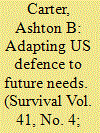

|
|
|
| 2 |
ID:
071832
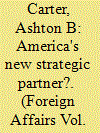

|
|
|
|
|
| Publication |
2006.
|
| Summary/Abstract |
Over the last year, the U.S. and Indian governments struck a deal that recognizes India as a nuclear weapons power. Critics say Washington gave up too much too soon and at a great cost to nonproliferation efforts. Perhaps. But India could in time become a valuable security partner. So despite the deal's flaws and the uncertainties surrounding its implementation, Washington should move forward with it.
|
|
|
|
|
|
|
|
|
|
|
|
|
|
|
|
| 3 |
ID:
041522
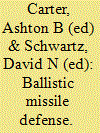

|
|
|
|
|
| Publication |
Washington D.C., Brookings Institution, 1984.
|
| Description |
xiii, 455p.
|
| Standard Number |
0815713118
|
|
|
|
|
|
|
|
|
|
|
|
Copies: C:1/I:0,R:0,Q:0
Circulation
| Accession# | Call# | Current Location | Status | Policy | Location |
| 026883 | 358.17/CAR 026883 | Main | On Shelf | General | |
|
|
|
|
| 4 |
ID:
077904


|
|
|
| 5 |
ID:
078650
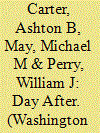

|
|
|
|
|
| Publication |
2007.
|
| Summary/Abstract |
Failure to develop a comprehensive contingency plan, such as the one proposed here, and inform the American public, where appropriate, about its particulars will only serve to amplify the devastating impact of any nuclear attack on a U.S. city.
|
|
|
|
|
|
|
|
|
|
|
|
|
|
|
|
| 6 |
ID:
087653


|
|
|
|
|
| Publication |
2009.
|
| Summary/Abstract |
The next American president will face a daunting list of national security problems, including a serious defense budget crunch. The budget crisis will be deepened by the global financial crisis, a tapering of supplemental funding associated with the wars in Iraq and Afghanistan, and the steady growth of military healthcare and other personnel costs. After six years of rapid defense budget increases, the Pentagon has lost the practice of matching strategy and resources. The next president will need to manage risk among investments in irregular warfare, counterterrorism, balancing new super powers, countering weapons of mass destruction, and traditional warfare. He will also need to begin to build non-military "soft power" capabilities outside of the Pentagon.
|
|
|
|
|
|
|
|
|
|
|
|
|
|
|
|
| 7 |
ID:
059348


|
|
|
|
|
| Publication |
Sep-Oct 2004.
|
|
|
|
|
|
|
|
|
|
|
|
|
|
|
|
| 8 |
ID:
041318
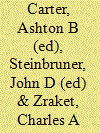

|
|
|
|
|
| Publication |
Washington DC, The Brooking'sInstitution, 1987.
|
| Description |
xxii, 751p.
|
| Standard Number |
0815713134
|
|
|
|
|
|
|
|
|
|
|
|
Copies: C:1/I:0,R:0,Q:0
Circulation
| Accession# | Call# | Current Location | Status | Policy | Location |
| 030431 | 355.0217/CAR 030431 | Main | On Shelf | General | |
|
|
|
|
| 9 |
ID:
126275
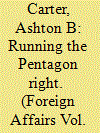

|
|
|
|
|
| Publication |
2014.
|
| Summary/Abstract |
War inevitably presents unexpected challenges. From Germany's use of mustard gas during World War I to North Vietnam's surprisingly effective use of its air defense system during the Vietnam War, the United States has always faced unanticipated threats in combat that have required agile responses. U.S. troops on the ground continually adjust to changing enemy tactics with the capabilities they have at hand. Yet the part of the Defense Department that trains and equips those troops has rarely been as flexible.
|
|
|
|
|
|
|
|
|
|
|
|
|
|
|
|